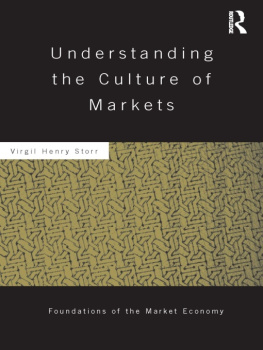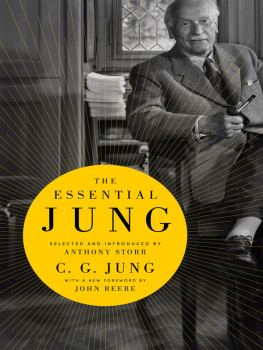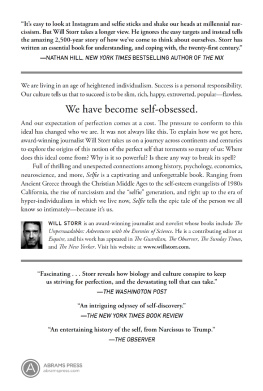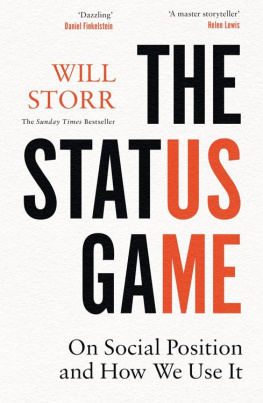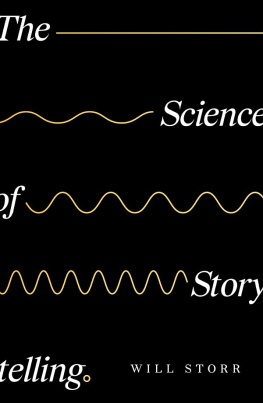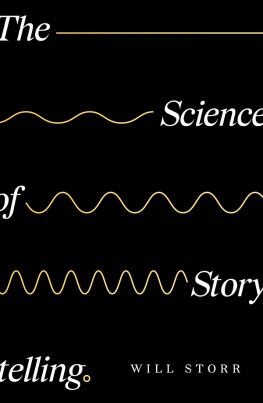Storr - Understanding the culture of markets / Virgil Henry Storr.
Here you can read online Storr - Understanding the culture of markets / Virgil Henry Storr. full text of the book (entire story) in english for free. Download pdf and epub, get meaning, cover and reviews about this ebook. City: Abingdon, Oxfordshire, year: 2015, publisher: Routledge, genre: Politics. Description of the work, (preface) as well as reviews are available. Best literature library LitArk.com created for fans of good reading and offers a wide selection of genres:
Romance novel
Science fiction
Adventure
Detective
Science
History
Home and family
Prose
Art
Politics
Computer
Non-fiction
Religion
Business
Children
Humor
Choose a favorite category and find really read worthwhile books. Enjoy immersion in the world of imagination, feel the emotions of the characters or learn something new for yourself, make an fascinating discovery.
- Book:Understanding the culture of markets / Virgil Henry Storr.
- Author:
- Publisher:Routledge
- Genre:
- Year:2015
- City:Abingdon, Oxfordshire
- Rating:3 / 5
- Favourites:Add to favourites
- Your mark:
- 60
- 1
- 2
- 3
- 4
- 5
Understanding the culture of markets / Virgil Henry Storr.: summary, description and annotation
We offer to read an annotation, description, summary or preface (depends on what the author of the book "Understanding the culture of markets / Virgil Henry Storr." wrote himself). If you haven't found the necessary information about the book — write in the comments, we will try to find it.
Storr: author's other books
Who wrote Understanding the culture of markets / Virgil Henry Storr.? Find out the surname, the name of the author of the book and a list of all author's works by series.
Understanding the culture of markets / Virgil Henry Storr. — read online for free the complete book (whole text) full work
Below is the text of the book, divided by pages. System saving the place of the last page read, allows you to conveniently read the book "Understanding the culture of markets / Virgil Henry Storr." online for free, without having to search again every time where you left off. Put a bookmark, and you can go to the page where you finished reading at any time.
Font size:
Interval:
Bookmark:
Culture of Markets
Virgil Henry Storr

First published 2013
by Routledge
2 Park Square, Milton Park, Abingdon, Oxon OX14 4RN
Simultaneously published in the USA and Canada
by Routledge
711 Third Avenue, New York, NY 10017
Routledge is an imprint of the Taylor & Francis Group, an informa business
2013 Virgil Henry Storr
The right of Virgil Henry Storr to be identified as author of this workhas been asserted by him in accordance with the Copyright, Designsand Patent Act 1988.
All rights reserved. No part of this book may be reprinted or reproducedor utilised in any form or by any electronic, mechanical, or other means,now known or hereafter invented, including photocopying and recording,or in any information storage or retrieval system, without permission inwriting from the publishers.
Trademark notice: Product or corporate names may be trademarks or registered trademarks, and are used only for identification and explanation without intent to infringe.
British Library Cataloguing in Publication Data
A catalogue record for this book is available from the British Library
Library of Congress Cataloging in Publication Data
Storr, Virgil Henry
Understanding the culture of markets/Virgil Storr.
p. cm.(Routledge foundations of the market economy; 31)
Includes bibliographical references and index.
1. EconomicsSociological aspects. I. Title.
HM548.S76 2012
330dc23
2012011066
ISBN: 978-0-415-77746-9 (hbk)
ISBN: 978-0-203-09549-2 (ebk)
Typeset in Times New Roman
by Florence Production Ltd, Stoodleigh, Devon, UK
How does culture shape economic life? Is culture like a ball and chain that actors must lug around as they pursue their material interests? Or, is culture like a toolkit from which entrepreneurs can draw resources to aid them in their efforts? Or, is being immersed in a culture like wearing a pair of blinders? Or, is culture like wearing a pair of glasses with tinted lenses? Understanding the Culture of Markets explores how culture shapes economic activity and describes how social scientists (especially economists) should incorporate considerations of culture into their analysis.
Although most social scientists recognize that culture shapes economic behavior and outcomes, the majority of economists are not very interested in culture. Understanding the Culture of Markets begins with a discussion of the reasons why economists are reluctant to incorporate culture into economic analysis. It then goes on to describe how culture shapes economic life, and critiques those few efforts by economists to discuss the relationship between culture and markets. Finally, building on the work of Max Weber, it outlines and defends an approach to understanding the culture of markets.
In order to understand real world markets, economists must pay attention to how culture shapes economic activity. If culture does indeed color economic life, economists cannot really avoid culture. Instead, the choice that they face is not whether or not to incorporate culture into their analysis but whether to employ culture implicitly or explicitly. Ignoring culture may be possible but avoiding culture is impossible. Understanding the Culture of Markets will appeal to economists interested in how culture shapes economic life, in addition to economic anthropologists and economic sociologists. It should be useful in graduate and undergraduate courses in all of those fields.
Virgil Henry Storr is a Senior Research Fellow and the Director of Graduate Student Programs at the Mercatus Center, George Mason University, USA. He is also a Research Associate Professor in the Department of Economics at George Mason University.
Storr issues a challenge to the entire discipline of economics in this deep and innovative study. It should be required reading in every undergraduate class on markets and economic theory. A brave and spirited work that carves out new intellectual territory for economics, this book opens a crucially important conversation between economists and other social scientists, asking fundamental questions about what determines behavior in markets. Storr is definitely pushing the boundaries of economics, opening up the most fundamental issues in the theory of markets. This work will be welcomed by social scientists in many disciplines, and it should be read by any serious student of markets.
Richard Wilk, Provosts Professor of Anthropology,
Indiana University, USA
Storrs beautifully written book puts forward a theory of the animating spirit in an economy, in the style of Max Webers ethicwithout the Protestantism. He replies to Samuelsonian economists who want to reduce everything to Capital and to Austrian economists who are not willing to take the next step into culture that their theories demand. In short, he and a handful of others, may their tribe increase, are initiating a humanomics, that is, an economics with people instead of sociopaths at its center.
Deirdre McCloskey, Distinguished Professor of Economics, History,
English, and Communication, University of Illinois at Chicago, USA
Economists have all too often either ignored culture completely, or failed to do justice to it by assimilating it to some other phenomenonsuch as capitalthat provides a poor model for understanding its true nature and significance. Virgil Storr is different. He has thought hard about how to conceptualize culture, about the relationship between culture and economic activity, and about how an appreciation of culture should affect the way that economists carry out applied work. This careful, insightful, and persuasive book is the outcome of his reflections. Economists who want a more sophisticated way of thinking not only about culture but also, given cultures impact on economic activity, about markets, will benefit greatly from reading it. Social scientists from other disciplines who have previously despaired of finding a culturally literate economist will also find much to ponder and value in this fine work of scholarship.
Paul Lewis, Reader in Economics and Public Policy,
Kings College London, UK
In one of the most controversial works in social science, Max Weber argued that without taking the spirit of capitalism into account, you cannot understand the modern economy. More than a century later, Virgil Storr argues that without taking the spirits that animate markets into account, you cannot understand the modern economy. Was Weber right or wrong; is Storr right or wrong? Different readers will no doubt give different answers. But all will agree that Storr raises questions that are absolutely essential to get a better grip on the modern economy.
Richard Swedberg, Professor of Sociology, Cornell University, USA
In Understanding the Culture of Markets Virgil Storr makes a major contribution to the under-explored intersection between cultural and economic processes. The customary perspective the economics discipline brings to cultural analysis is either to collapse nuanced cultural processes into a rational choice model of human decision making or to cast culture in the role of economic spoileras a set of constraints that stands in the way of productive life. In Storrs hands, culture receives the nuanced treatment it deserves as he explores the ways in which culture shapes and undergirds all of productive life. In short, Storr delivers on his promise to offer an economics of meaning.
Font size:
Interval:
Bookmark:
Similar books «Understanding the culture of markets / Virgil Henry Storr.»
Look at similar books to Understanding the culture of markets / Virgil Henry Storr.. We have selected literature similar in name and meaning in the hope of providing readers with more options to find new, interesting, not yet read works.
Discussion, reviews of the book Understanding the culture of markets / Virgil Henry Storr. and just readers' own opinions. Leave your comments, write what you think about the work, its meaning or the main characters. Specify what exactly you liked and what you didn't like, and why you think so.

